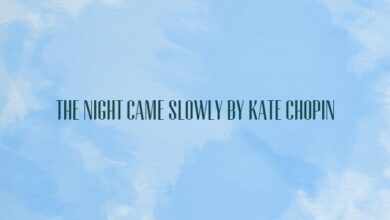
The Unexpected by Kate Chopin
When Randall, for a brief absence, left his Dorothea, whom he was to marry after a time, the parting was bitter; the enforced separation seemed to them too cruel an ordeal to bear. The good-bye dragged with lingering kisses and sighs, and more kisses and more clinging till the last wrench came.
He was to return at the close of the month. Daily letters, impassioned and interminable, passed between them.
He did not return at the close of the month; he was delayed by illness. A heavy cold, accompanied by fever, contracted in some unaccountable way, held him to his bed. He hoped it would be over and that he would rejoin her in a week. But this was a stubborn cold, that seemed not to yield to familiar treatment; yet the physician was not discouraged, and promised to have him on his feet in a fortnight.
All this was torture to the impatient Dorothea; and if her parents had permitted, she surely would have hastened to the bedside of her beloved.
For a long interval he could not write himself. One day he seemed better; another day a “fresh cold” seized him with relentless clutch; and so a second month went by, and Dorothea had reached the limit of her endurance.
Then a tremulous scrawl came from him, saying he would be obliged to pass a season at the south; but he would first revisit his home, if only for a day, to clasp his dearest one to his heart, to appease the hunger for her presence, the craving for her lips that had been devouring him through all the fever and pain of this detestable illness.
Dorothea had read his impassioned letters almost to tatters. She had sat daily gazing for hours upon his portrait, which showed him to be an almost perfect specimen of youthful health, strength and manly beauty.
She knew he would be altered in appearance–he had prepared her, and had even written that she would hardly know him. She expected to see him ill and wasted; she would not seem shocked; she would not let him see astonishment or pain in her face. She was in a quiver of anticipation, a sensuous fever of expectancy till he came.
She sat beside him on the sofa, for after the first delirious embrace he had been unable to hold himself upon his tottering feet, and had sunk exhausted in a corner of the sofa. He threw his head back upon the cushions and stayed, with closed eyes, panting; all the strength of his body had concentrated in the clasp–the grasp with which he clung to her hand.
She stared at him as one might look upon a curious apparition which inspired wonder and mistrust rather than fear. This was not the man who had gone away from her; the man she loved and had promised to marry. What hideous transformation had he undergone, or what devilish transformation was she undergoing in contemplating him? His skin was waxy and hectic, red upon the cheek-bones. His eyes were sunken; his features pinched and prominent; and his clothing hung loosely upon his wasted frame. The lips with which he had kissed her so hungrily, and with which he was kissing her now, were dry and parched, and his breath was feverish and tainted.
At the sight and the touch of him something within her seemed to be shuddering, shrinking, shriveling together, losing all semblance of what had been. She felt as if it was her heart; but it was only her love.
“This is the way my uncle Archibald went–in a gallop–you know.” He spoke with a certain derision and in little gasps as if breath were failing him. “There’s no danger of that for me, of course, once I get south; but the doctors won’t answer for me if I stay here during the coming fall and winter.”
Then he held her in his arms with what seemed to be a frenzy of passion; a keen and quickened desire beside which his former and healthful transports were tempered and lukewarm by comparison.
“We need not wait, Dorothea,” he whispered. “We must not put it off. Let the marriage be at once, and you will come with me and be with me. Oh, God! I feel as if I would never let you go; as if I must hold you in my arms forever, night and day, and always!”
She attempted to withdraw from his embrace. She begged him not to think of it, and tried to convince him that it was impossible.
“I would only be a hindrance, Randall. You will come back well and strong; it will be time enough then,” and to herself she was saying: “never, never, never!” There was a long silence, and he had closed his eyes again.
“For another reason, my Dorothea,” and then he waited again, as one hesitates through shame or through fear, to speak. “I am quite — almost sure I shall get well; but the strongest of us cannot count upon life. If the worst should come I want you to have all I possess; what fortune I have must be yours, and marriage will make my wish secure. Now I’m getting morbid.” He ended with a laugh that died away in a cough which threatened to wrench the breath from his body, and which brought the attendant, who had waited without, quickly to his side.
Dorothea watched him from the window descend the steps, leaning upon the man’s arm, and saw him enter his carriage and fall helpless and exhausted as he had sunk an hour before in the corner of her sofa.
She was glad there was no one present to compel her to speak. She stayed at the window as if dazed, looking fixedly at the spot where the carriage had stood. A clock on the mantel striking the hour finally roused her, and she realized that there would soon be people appearing whom she would be forced to face and speak to.
Fifteen minutes later Dorothea had changed her house gown, had mounted her “wheel,” and was fleeing as if Death himself pursued her.
She sped along the familiar roadway, seemingly borne on by some force other than mechanical-some unw onted energy–a stubborn impulse that lighted her eyes, set her cheeks aflame, bent her supple body to one purpose–that was, swiftest flight.
How far, and how long did she go? She did not know; she did not care. The country about her grew unfamiliar. She was on a rough, unfrequented road, where the birds in the wayside brooks seemed unafraid. She could perceive no human habitation; an old fallow field, a stretch of wood, great trees bending thick-leaved branches languidly, and flinging long, inviting shadows about the road; the woody smell of summer; the drone of the insects; the sky and the clouds, and the quivering, lambent air. She was alone with nature; her pulses beating in unison with its sensuous throb, as she stopped and stretched herself upon the sward. Every muscle, nerve, fibre abandoned itself to the delicious sensation of rest that overtook and crept tingling through the whole length of her body.
She had never spoken a word after bidding him good-by; but now she seemed disposed to make confidants of the tremulous leaves, or the crawling and hopping insects, or the big sky into which she was staring.
“Never!” she whispered, “not for all his thousands! Never, never! not for millions!”





